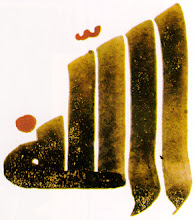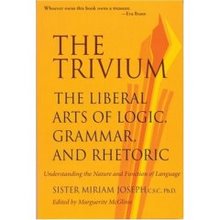Classical education as understood and taught in the Middle Ages of Western culture is roughly based on the ancient Greek concept of Paideia. China had a completely different tradition of classical education, based in large part on Confucian and Taoist traditions. This article concerns the Western tradition.
The overall organization
Classical education developed many of the terms now used to describe modern education. Western classical education has three phases, each with a different purpose. The phases are roughly coordinated with human development, and would ideally be exactly coordinated with each individual student's development.
"Primary education" teaches students how to learn.
"Secondary education" then teaches a conceptual framework that can hold all human knowledge (history), and then fills in basic facts and practices of the major fields of knowledge, and develops the skills (perhaps in a simplified form) of every major human activity.
"Tertiary education" then prepares a person to pursue an educated profession, such as law, theology, military strategy, medicine or science.
Primary Education
Primary education was often called the trivium, which covered grammar, logic, and rhetoric.
Logic and rhetoric was often taught in part by the Socratic method, in which the teacher raises questions and the class discusses them. By controlling the pace, the teacher can keep the class very lively, yet disciplined.
Grammar
Grammar consists of language skills such as reading and the mechanics of writing. An important goal of grammar is to acquire as many words and manage as many concepts as possible so as to be able to express and understand clearly concepts of varying degrees of complexity. Very young students can learn these by rote especially through the use of chant and song. Their minds are often referred to as "sponges", that easily absorb a large number of facts. Classical education traditionally included study of Latin and Greek, which greatly reinforced understanding of grammar, and the workings of a language, and so that students could read the Classics of Western Civilization in the words of the authors. In the modern renaissance of classical education, this period refers to the upper elementary school years.
Logic
Logic (dialectic) is the art of correct reasoning. The traditional text for teaching logic was Aristotle's Logic. In the modern renaissance of classical education, this logic stage (or dialectic stage) refers to the junior high or middle school aged student, who developmentally is beginning to question ideas and authority, and truly enjoys a debate or an argument. Training in logic, both formal and informal, enables students to critically examine arguments and to analyze their own.
Rhetoric
Rhetoric debate and composition (which is the written form of rhetoric) are taught to somewhat older (often high school aged) students, who by this point in their education have the concepts and logic to criticize their own work and persuade others. According to Aristotle "Rhetoric is the counterpart of dialectic." It is concerned with finding "all the available means of persuasion." The student has learned to reason correctly in the Logic stage so that they can now apply those skills to Rhetoric. Students would read and emulate classical poets such as Ovid and others in learning how to present their arguments well.
Secondary Education
Secondary education, classically the quadrivium or "four ways," classically taught astronomy, arithmetic, music and geometry, usually from Aristotle and Euclid. Sometimes architecture was taught, often from the works of Vitruvius.
History was always taught to provide a context, and show political and military development. The classic texts were from ancient authors such as Cicero and Tacitus.
Biographies were often assigned as well; the classic example being Plutarch's "Lives." Biographies help show how persons behave in their context, and the wide ranges of professions and options that exist. As more modern texts became available, these were often added to the curriculum.
In the Middle Ages, these were the best available texts. In modern terms, these fields might be called history, natural science, accounting and business, fine arts (at least two, one to amuse companions, and another to decorate one's domicile), military strategy and tactics, engineering, agronomy, and architecture.
These are taught in a matrix of history, reviewing the natural development of each field for each phase of the trivium. That is, in a perfect classical education, the historical study is reviewed three times: first to learn the grammar (the concepts, terms and skills in the order developed), next time the logic (how these elements could be assembled), and finally the rhetoric, how to produce good, humanly useful and beautiful objects that satisfy the grammar and logic of the field.
History is the unifying conceptual framework, because history is the study of everything that has occurred before the present. A skillful teacher also uses the historical context to show how each stage of development naturally poses questions and then how advances answer them, helping to understand human motives and activity in each field. The question-answer approach is called the "dialectic method," and permits history to be taught Socratically as well.
Classical educators consider the Socratic method to be the best technique for teaching critical thinking. In-class discussion and critiques are essential in order for students to recognize and internalize critical thinking techniques. This method is widely used to teach both philosophy and law. It is currently rare in other contexts. Basically, the teacher referees the students' discussions, asks leading questions, and may refer to facts, but never gives a conclusion until at least one student reaches that conclusion. The learning is most effective when the students compete strongly, even viciously in the argument, but always according to well-accepted rules of correct reasoning. That is, fallacies should not be allowed by the teacher.
By completing a project in each major field of human effort, the student can develop a personal preference for further education and professional training.
Tertiary Education
Tertiary education was usually an apprenticeship to a person with the desired profession. Most often, the understudy was called a "secretary" and had the duty of carrying on all the normal business of the "master." Philosophy and Theology were both widely taught as tertiary subjects in Universities however.
The early biographies of nobles show probably the ultimate form of classical education: A tutor. One early, much-emulated classic example was that Alexander the Great was tutored by Aristotle.
Modern Interpretations of Classical Education
Much of the current and modern renaissance of classical education is owed to the Dorothy Sayers essay, "The Lost Tools of Learning", in which she describes the three stages of the trivium, grammar, logic and rhetoric, as tools by which a student can then analyze and master every other subject.
"The Well-Trained Mind: A Guide to Classical Education at Home," by Jessie Wise and Susan Wise Bauer (W.W. Norton, 1999), is a modern reference on classical education, particularly in a homeschool setting. It provides a history of classical education, an overview of the methodology and philosophy of classical education, and annotated lists of books, divided by grade and topic, that list the best books for classical education in each category.
"The Grammar of Our Civility: Classical Education in America," by Lee T. Pearcy (2005) provides a theoretical and historical account of classical education in the United States and suggests the need for a distinctly American approach to ancient Greece and Rome.
Marva Collins has successfully taught a rapid-fire classical education to inner-city deprived children, many of them labeled as "retarded."
Also of note is "A New Trivium and Quadrivium," an article by Dr. George Bugliarello (Bulletin of Science, Technology & Society, Vol. 23, No. 2, 106-113 (2003)). In it, he argues that the scope of the classical liberal education is inadequate for today's society, and that people should also be conversant with the basic facts of science and technology, since they now form a much more important part of our lives than did the tertiary studies of antiquity. He argues for a new synthesis of science, engineering, and the humanities in which there is a balance between what can be done and what ought to be done, between human desires and earthly consequences, and between our ever-increasing power to affect our surroundings and the ever-present danger of destroying the ecological and environmental systems which allow us to exist.
No discussion of classical education could be complete without mentioning Mortimer Adler and Robert Hutchins, both of the University of Chicago, who set forth in the 1930s to restore the "Great Books" of Western civilization to center stage in the curriculum. Although the standard classical works—such as the Harvard Classics—most widely available at the time, were decried by many as out of touch with modern times, Adler and Hutchins sought to expand on the standard "classics" by including more modern works, and by trying to tie them together in the context of what they described as the "Great Ideas," condensed into a "Syntopicon" index and bundled together with a new "five foot shelf" of books as "The Great Books of the Western World." They were wildly popular during the Fifties, and discussion groups of aficionados were found all over the USA, but their popularity waned during the Sixties and such groups are relatively hard to find today. Extensions to the original set are still being published, encompassing selections from both current and older works which extend the "great ideas" into the present age and other fields, including civil rights, the global environment, and discussions of multiculturalism and assimilation.
There still exist a number of informal groups and professional organizations which take the classical approach to education seriously, and who undertake it in earnest. Within the classical Christian education movement, David Hicks, author of Norms and Nobility, the Society for Classical Learning, the Association of Classical and Christian Schools, and the CiRCE Institute, founded by Andrew Kern, co-author with Gene Edward Veith of Classical Education: The Movement Sweeping America, play a leading role.
In addition to many middle-schools and high schools across the country, there are at present several universities or colleges in the United States wherein such an Oxfordian classical education is taking place:
St. John's College (two campuses, one in MD and one in NM)
Thomas Aquinas College in Santa Paula, CA
New Saint Andrews College in Moscow, ID
The Torrey Honors Institute at Biola University, in La Mirada, CA
Gutenberg College in Eugene, OR
At each of these institutions some variation of the Canon of Western Great Books is used as the primary course material, and tutor-lead "Socratic discussions" are the primary vehicle for ingestion and digestion of the selected works.
A more traditional, but less common view of classical education arises from the ideology of the Renaissance, advocating an education grounded in the languages and literatures of Greece and Rome. The demanding and lengthy training period required for learing to read Greek and Latin texts in their original form has been crowded out in most American schools in favor of contemporary subjects. Latin is taught at some schools, but Greek rarely.
This article was taken from:
Wikipedia.org




